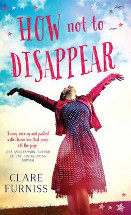How not to disappear by Clare Furniss

Simon and Schuster, 2016. ISBN 9781471120305
(Age: 16+) Recommended for mature readers. Themes: Unplanned
pregnancy; Regret; Decisions; Family; Relationships; Memory and
Memory loss. Memories and our past - how important are they? Do they
define us? To Hattie and her Great Aunt Gloria they are what connect
them. Surprisingly they are connected in ways beyond their familial
link. Hattie is a young teen dealing with the normal stresses of
life and family. She is dependable and caring and she has just found
out she is pregnant. Her turmoil occurs at the same time as an
unknown elderly relative appears in her life. Gloria was fiercely
non-conformist in her youth (a trait she retains in her senior
years) and never had anything to do with her extended family, but
now connects with Hattie at a time when her memory is becoming
unreliable and her sense of self is disappearing. The unusual
cross-generational Thelma and Louise road trip that they
take to rediscover Gloria's past is also a time of discovery for
Hattie and the important decisions she must make about her future .
. . and the future of her relationships with the father of her
unborn child and everyone else in her life.
This is a compelling story - an adult tale of dementia and unplanned
pregnancy written for a younger audience. It is confronting and the
dilemmas facing both Hattie and Gloria are filled with uncertainty.
Clare Furniss, the author of The Year of the Rat, writes
powerfully about internal struggle and the fears and conflict that
accompany some major decisions. Abortion, unplanned pregnancy across
the generations, adoption, regret and its consequences are addressed
in the different voices of the disparate generations. Gloria's story
as she seeks to remember and be remembered is extremely moving and
gives Hattie and the reader a powerful insight into changed
relationships and the struggles and decisions that accompany an
unplanned pregnancy, and the struggle to retain your identity when
your past and memory disappears.
Written through the voices of the young Hattie; Gloria, as she
remembers her life from the past, and at the present time with her
failing hold on memory; and also with excerpts from text and email
exchanges. This variety adds to the appeal of the book. The setting
within beautiful English countryside has a minor role in influencing
the story, but will appeal to Anglophile readers. Minor characters
are also well developed and interesting, secondary to the essence of
the book, but important to understanding the two main characters.
Recommended for mature readers aged 16+.
Carolyn Hull